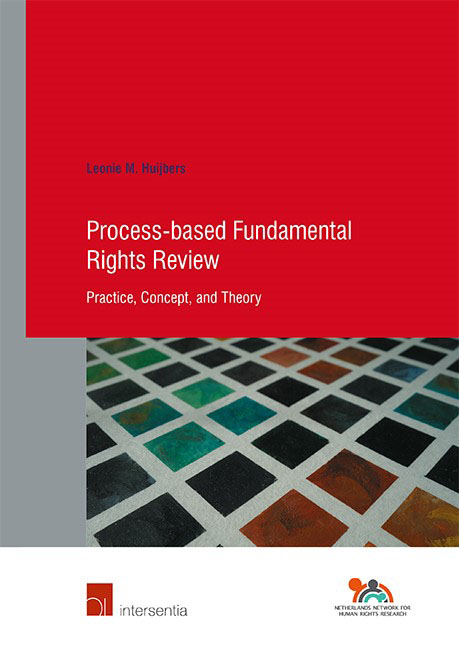Book contents
- Frontmatter
- Acknowledgments
- Contents
- List of Abbreviations
- INTRODUCTION
- PART I THE PRACTICE OF PROCESS-BASED FUNDAMENTAL RIGHTS REVIEW
- PART II THE CONCEPT OF PROCESS-BASED FUNDAMENTAL RIGHTS REVIEW
- PART III THE THEORY ON PROCESS-BASED FUNDAMENTAL RIGHTS REVIEW
- CONCLUSION
- Addendum: Questions for ECtHR Judges
- Summary
- Samenvatting
- Bibliography
- Official Documents
- Case-Law (by Jurisdiction)
- Case-Law (by Name)
- Curriculum vitae
- Human Rights Research Series
- Index
Reflection on Part II
Published online by Cambridge University Press: 11 November 2021
- Frontmatter
- Acknowledgments
- Contents
- List of Abbreviations
- INTRODUCTION
- PART I THE PRACTICE OF PROCESS-BASED FUNDAMENTAL RIGHTS REVIEW
- PART II THE CONCEPT OF PROCESS-BASED FUNDAMENTAL RIGHTS REVIEW
- PART III THE THEORY ON PROCESS-BASED FUNDAMENTAL RIGHTS REVIEW
- CONCLUSION
- Addendum: Questions for ECtHR Judges
- Summary
- Samenvatting
- Bibliography
- Official Documents
- Case-Law (by Jurisdiction)
- Case-Law (by Name)
- Curriculum vitae
- Human Rights Research Series
- Index
Summary
The discussions in Chapters 5 and 6 have provided a conceptual-theoretical, yet practically informed understanding of process-based fundamental rights review. On the basis of the literature on, and examples of, procedural reasoning, process-based fundamental rights review has been defined as ‘ judicial reasoning that assesses public authorities’ decision-making processes in light of procedural fundamental rights standards’. This definition includes the constitutive elements of the concept of procedural reasoning. First, there needs to be a reviewer, in this book, that is the courts. Secondly, there is a subject whose decision-making procedure is under review. In this book, this is a public authority, who can be positioned in the legislative, executive, or judicial branch. Thirdly, the objects of review of procedural reasoning are decisionmaking processes. And, fourthly, procedural reasoning is an evaluative method, which means that courts assess decision-making procedures based on applicable procedural standards in order to make a normative decision.
The discussion of the concept of process-based review highlighted some of the complexities surrounding this type of review. Indeed, the object of review itself is not easily determined. Chapter 5 has shown the difficulties with separating procedural and substantive considerations. It explained that the distinction between the concepts of process and substance is a constructed one, and that there is a twilight zone between both concepts. This means that certain fundamental rights standards or judicial considerations can be regarded as both procedural and substantive. The conceptualisation of procedural reasoning becomes even more intricate as the substance/ process distinction plays a predominant role at a micro-level of caselaw analysis. At this level the conceptual focus is on labelling considerations of courts as ‘ procedural’ or ‘substantive’. Yet, at a meso-level, which focuses on the various justification tests courts apply (e.g., legitimate aim, suitability, necessity and proportionality), courts rely on a combination of considerations to determine whether or not a test was met. Because of the combination of various considerations, courts rarely apply purely procedural reasoning, that is, reasoning which entails exclusively procedural considerations. Process-based review is therefore conceptualised as sitting on a spectrum of judicial review. This continuum ranges from purely procedural reasoning to purely substantive reasoning, with mixed forms in between.
- Type
- Chapter
- Information
- Process-based Fundamental Rights ReviewPractice, Concept, and Theory, pp. 171 - 174Publisher: IntersentiaPrint publication year: 2021



